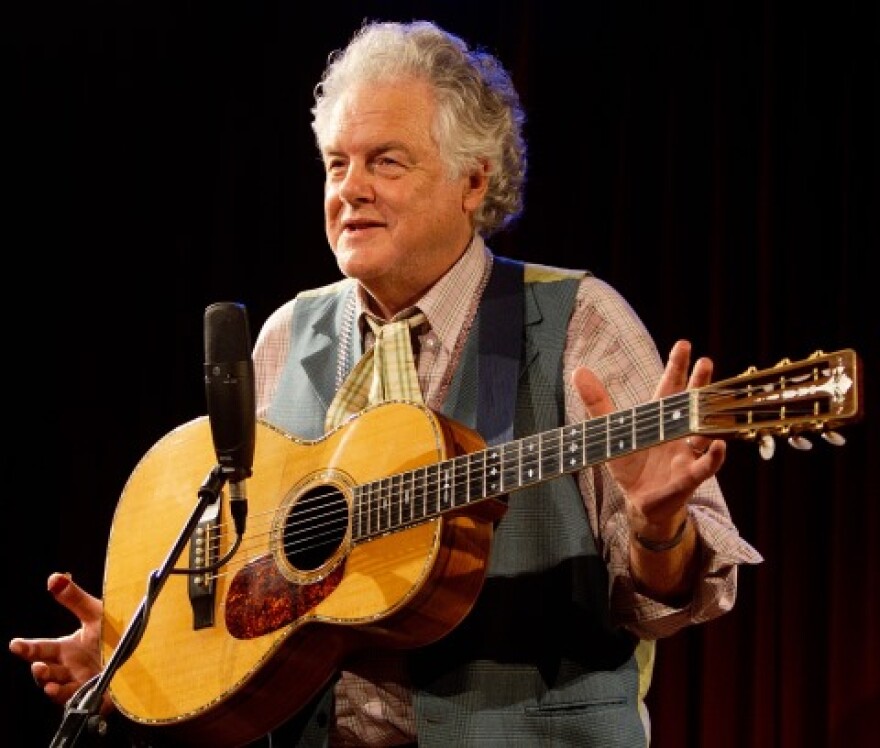Singer-songwriter Peter Rowan is bluegrass royalty, having performed with some of the genre’s biggest legends during his five-decade career including Bill Monroe, Del McCoury, David Grisman and Tony Rice. His newest album, which was released in July, is called Dharma Blues and is largely made up of spiritually influenced songs he wrote while traveling in India and Japan in the 1990s. Gillian Welch and former Jefferson Airplane bassist Jack Casady are just two of the many musicians who join him on the record.
Rowan performs this weekend in Flagstaff at the ninth annual Pickin’ in the Pines Bluegrass and Acoustic Music Festival at the Pepsi Amphitheater. He recently spoke with Arizona Public Radio’s Ryan Heinsius about his new album and the highly influential band he formed with the Grateful Dead’s Jerry Garcia in the 1970s, Old and in the Way.
Peter Rowan: Jerry Garcia was the magic ingredient. Somebody showed me a calendar — you know, we only played for about a year-and-a-half, but it seemed like five years because everything was so epic and monumental — we played for Ken Kesey up in Oregon. We had no agenda. We just considered it lucky that Jerry could draw a crowd. And I think the joy is reflected in the music: Old and in the Way.

Ryan Heinsius: I’d like to talk a little bit about your new album, Dharma Blues, which came out in July. To me, the album has a somewhat reflective or even meditative quality. As you see it, what’s the common theme that weaves all these songs together?
PR: Well, I’ve always wished that my music would be something that'll inspire people to be bold in their own search. The Dharma Blues is the process of searching for enlightenment and writing songs about it. You keep on the search and even the search is dark sometimes, but you never let your light be dimmed. I would say that’s the message of the record.

RH: Spirituality plays a big role in much of your work and has for quite a long time. On the song “Vulture Peak” you include a Buddhist chant. Why exactly did you include that specific chant?
PR: This is sort of my Buddha-gospel album. It’s not hymns and things like that, but there are elements in it that are prayers — it’s my prayer album.
RH: On the surface, Eastern spirituality and Western roots music — which so often includes Christian hymns and gospel — they might not seem like an obvious pairing: the West and the East. For you, what is the link between the two?
PR: There are a lot of links. I loved bluegrass especially because it spoke of the earthiness of life. And most of the songs that I learned were all about suffering. To me, that’s all spiritual music the same as Buddhist music. You know, there’s no difference. It’s just a difference in the meaning, on a subtle level. It all lines up, if we’re not dogmatic about it and open minded about it we can make the world a good place.
RH: On the new album Gillian Welch joins you for a few songs.
PR: That’s just a total delight! Yeah!
RH: What exactly does she bring to a song like “Raven” for instance, which has a real old-timey flavor?
PR: Passion. Passion. And she kind of disappears. You know? It’s just the passion that’s there. It’s a search for the chill-bone factor. And you can’t script it, but sometimes that magic happens and there’s something bigger than the sum of its parts. The chill-bone factor, and you kind of get those chill bumps up in your arm. That’s a special thing and music that can do that for folks is — yeah, that’s the stuff to go for.








